WhatsApp has come a long way from its launch. WhatsApp has a certain dominance in the daily lives of people and that’s why the platform offers massive opportunities for businesses. More than 2 billion people around the world are currently using WhatsApp and the number is increasing everyday. Such a huge user base means businesses not using it are missing out on a significant potential customer base.
WhatsApp as a platform constantly tries to improve the user experience. So, with the aim of helping business users, WhatsApp Business was launched. WhatsApp and WhatsApp Business apps have some similarities as well as some differences. The similarities between these two are that they both have almost the same interface, are free to use, and can be connected to a single number. The differences on the other hand make WhatsApp Business an upgraded version of the standard chatting app. Some of the additional features are the business profile, product catalog, messaging automations among others.
Now, marketers believe that WhatsApp Business has the potential to take the business communications to a new level of engagement. GoodFirms surveyed 560 small and medium businesses who use the platform. The outcome is crucial information on why and how small businesses are using the tool.
Why Do Small Businesses Use WhatsApp?
Messaging channels such as SMS and Messenger still play an important role in the communication strategy for any business. But with the changing times, employing WhatsApp as a part of the messaging strategy can prove to be a game-changer. It will soon become a crucial tool to remain competitive. This is mostly because of the host of advantages that the platform offers to small businesses.
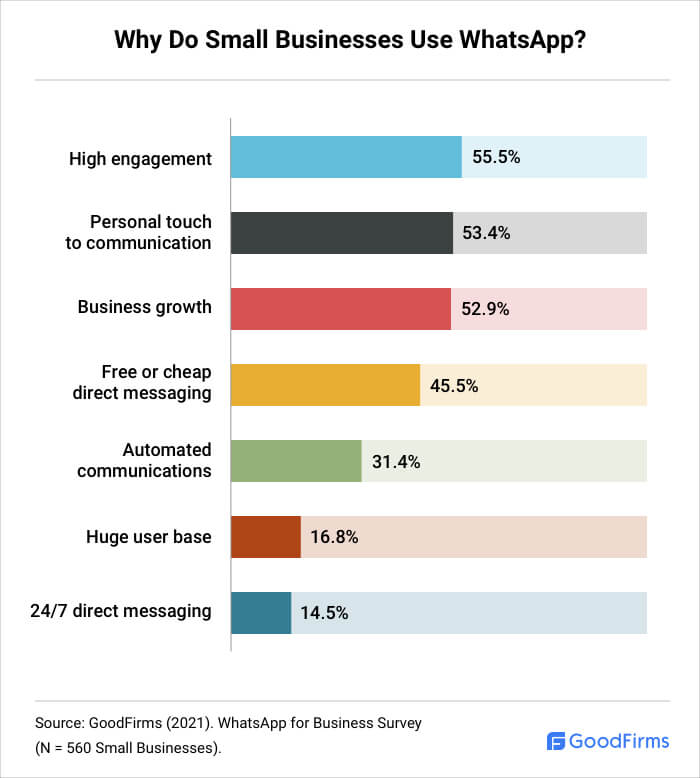
The primary reason small businesses use WhatsApp is that it allows higher engagement (55.5%) from customers. WhatsApp is an easy mode of day-to-day chatting, and people frequently open and respond to messages on the platform. Moreover, as all the business accounts are verified by WhatsApp, customers have the assurance that they are not conversing with an imposter. All of these factors result in a higher engagement rate.
53.4% of small businesses use WhatsApp as it gives a personal touch to communication. But WhatsApp enables businesses to give a personal touch to the communication by personally responding to the queries or offering personalized discounts to the customers. Not only that, but when businesses respond with empathy to customers’ problems, it comes across as trustworthy and reliable.
52.9% of survey participants are using the platform due to the growth opportunities it offers. WhatsApp Business app helps businesses to grow by allowing them to meet customers where they are. All the communication barriers are removed as the platform is free to access and already has a huge user base. A business can also share all the latest information, offers, and solve customer issues all in a single place. If used correctly and to its maximum potential, WhatsApp Business can improve the profitability of businesses by a significant margin.
Most Businesses Use WhatsApp for Customer Support
SMS and Email have been the most common channels that businesses use for connecting with customers. They are effective in their own way but not enough in an omnichannel way. But for conversational purposes, the WhatsApp Business app plays a multi-faceted role. Small businesses are majorly using their WhatsApp business account for customer support (67.1%).
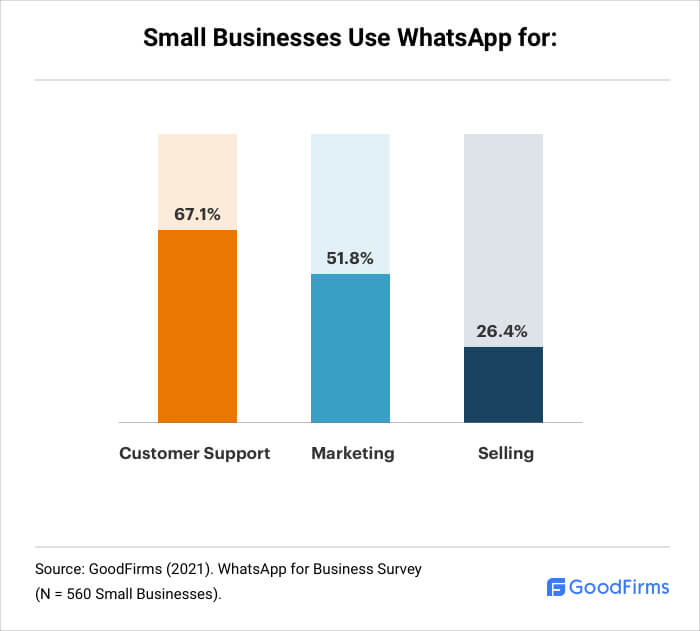
Strong brand relationships with their customers is the holy grail for any business. One of the ways to form such relationships is through efficient and personal customer service. The WhatsApp Business app comes with several features that will enable superior communication with customers. These features include quick replies, labels, automated messages for greetings, and many more. Apart from the features, it is an easy and affordable option to connect with a global customer base.
WhatsApp Business API is still developing as a platform for businesses. However, the key to success in marketing is to carve a niche on a platform before it becomes overcrowded. As WhatsApp for Business has started growing in popularity, 51.8% of small businesses already use it for marketing.
One of the prime examples of this is Financial Times who shares free content on WhatsApp. The subscriber-only publication shared two free articles daily on its WhatsApp group and ended up gaining more conversions than other social media platforms.
Lastly, very few SMBs (11.1%) use WhatsApp Business to sell directly to their customers.
How Do Small Businesses Use WhatsApp Business?
Every small business will have a different set of resources that it can spare. When it comes to using WhatsApp for business, they all cannot be using it in the same way. As per the GoodFirms survey, the majority (47.3%) of the businesses chat personally with their customers on WhatsApp.
One of the biggest advantages of communicating personally with customers is that they will get satisfactory answers to their queries as there is a human at the other end giving solutions to their problems. They will end up trusting the business more.
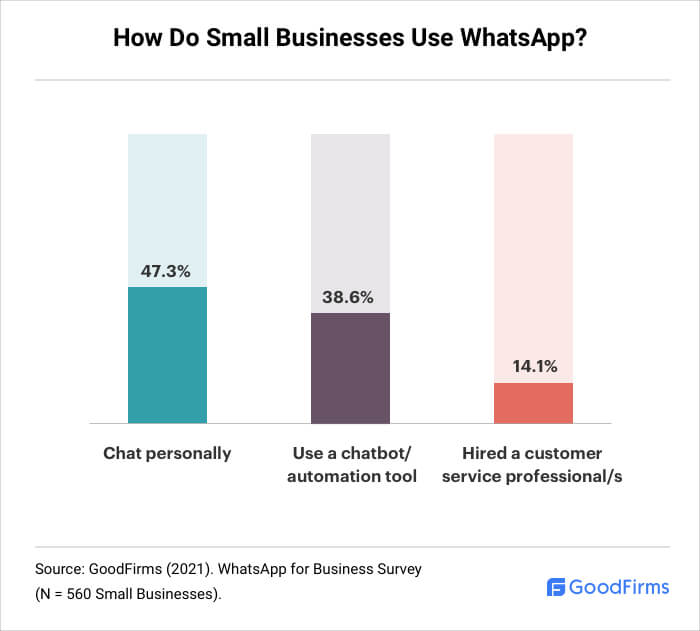
About 38.6% of small businesses use a chatbot or automation tool for their WhatsApp business account. That’s because it enables them to offer quick solutions to customer problems as and when they face problems. Mousumi, an SEO & Content Writer from Kommunicate, elaborates on the advantages of using a chatbot.
Mousumi says, “Customers expect a business to be available 24/7. It is not easy for a Small Business owner to resolve customer queries instantly or set up a customer support team. In this situation, small businesses can take the leverage of a chatbot in WhatsApp. In WhatsApp, small business owners can add chatbots to help businesses reduce customer service costs by implementing conversational solutions like the welcome message, thank you messages, ordering instructions, payment information, and discounts.”
There is also the option to hire customer service representatives to communicate with the customers. 14.1% of small businesses do so. However, not every small business can afford to hire customer service representatives.
"A dedicated customer service professional is always best if WhatsApp is used within an omnichannel solution that connects all contact channels into one single dashboard," suggests Chris Thomas, a Digital Marketing Executive from Talkative, "That way, customer service representatives can use WhatsApp alongside other channels like live chat, chatbots, and video chat. It's one of the best ways to ensure a seamless online experience for your customers.”
Which WhatsApp Features Do SMBs Focus On?
WhatsApp allows businesses to create next-generation experiences with some of their most out-of-the-box and customized features. The platform’s features go beyond the usual customer service. The goal here is to lay the foundation for conversational commerce.
WhatsApp for business makes a lot of this easier with its available features. The most popular feature is its business profile. 98.6% of businesses voted this is an important feature.
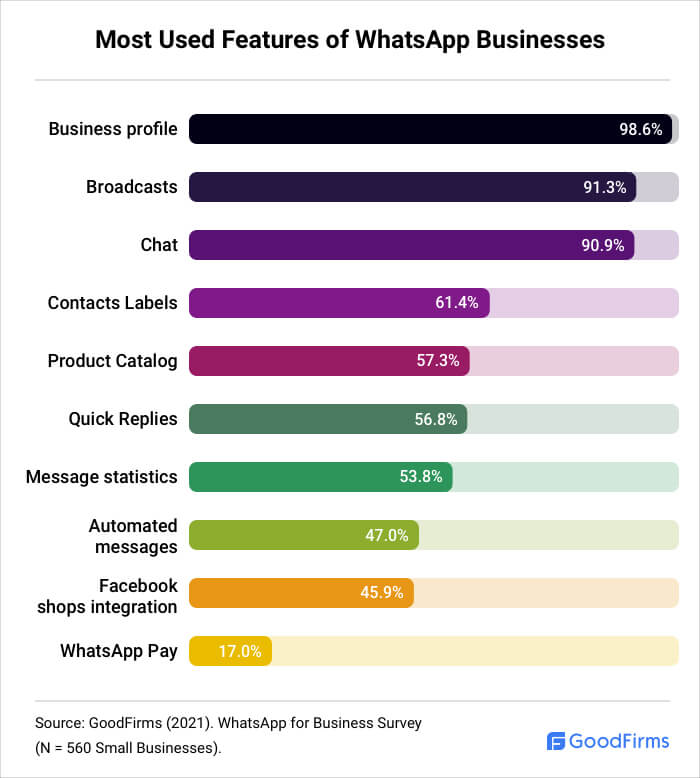
The profile page in WhatsApp Business is way more upgraded than the normal version of the platform. The business profile features:
- Cover photo
- Area of work
- Description
- Location
- Working hours
- Link to website
As it is the first thing that customers will see when they connect with the business, ensure that it contains all the necessary information and appears professional.
For 91.3% of surveyed SMBs, the broadcast feature is an important one too. The feature allows businesses to send bulk messages to a group of users at a time. The biggest advantage is that any content is allowed to be broadcasted in a WhatsApp Business app. So, businesses can send promotional messages too.
However, there are some limitations with the feature. Firstly, the business needs to create a broadcast list, and secondly, the broadcast lists are limited to 256 contacts. A way around this limitation is the restriction is for a single broadcast list. A business can make multiple broadcasts lists to remove the communication barrier.
Contact Labels is another important feature. 61.4% of SMBs voted in its favor. This feature helps businesses in managing communication with customers. A contact label could either have a single contact or multiple contacts. You can set up to 20 labels as per certain preferences like order, location, or new customers.
Where Do SMBs Promote their WhatsApp Presence?
It is not enough for small businesses to just be present on WhatsApp. It is also essential that their target market is aware of their presence.
A business needs to know where to promote its WhatsApp presence. “When looking to market their WhatsApp presence, SMBs should promote their service depending on their target audience and their intended use of the app," says Chris Thomas.
He gives an instance, "Customer service representatives using WhatsApp may find it most useful to advertise the service on the business's homepage and social media. On the other hand, if an SMB has a brick and mortar store and they're using WhatsApp to update their customers, in-store promotion using banners and QR codes are a great option.”
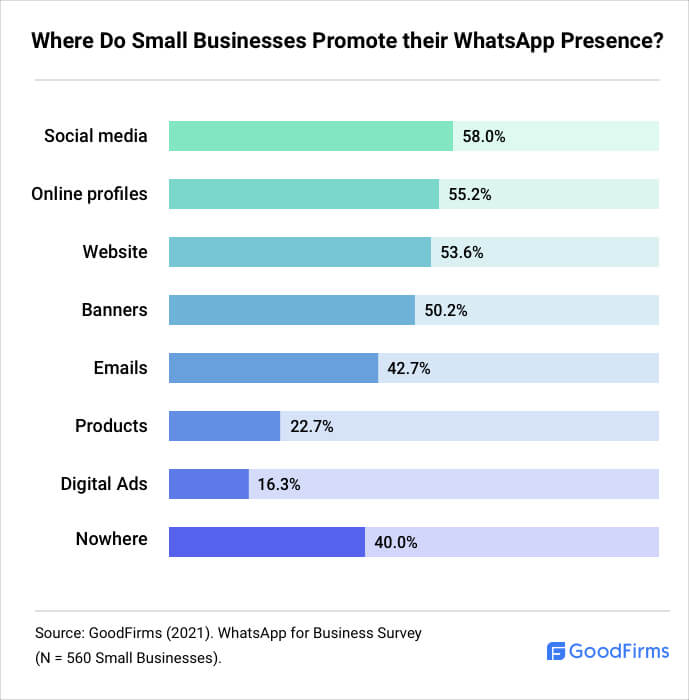
58% of SMBs believe social media platforms are the best place to do that.
The Head of Marketing at Photo AiD, Karolina Mlodzka, states a simple reason to use social media platforms. Karolina said, “WhatsApp Business is a fundamental tool for the user experience in your business. I would integrate this button into networks like Facebook and Instagram. Social media has reached a significantly high penetration rate, and the channels mentioned above are among the most used worldwide.”
A business’s website is usually the first place of interaction between the brand and customer. So, it only makes sense to create awareness about the WhatsApp presence on the official website. 53.6% of small business owners agree with this idea.
Ansh Gupta, CEO of BuySellEmpire, discusses why websites and social media platforms are where the WhatsApp presence should be promoted.
In his opinion, “Your website is one of your most important assets, so it is vital that you include all information regarding your business there. This includes all your promotional strategies, so your WhatsApp presence should be highlighted on your website. Other social media platforms such as Instagram, Facebook, and LinkedIn should also be used to promote your WhatsApp presence. The main reason for this is that the majority of WhatsApp users tend to use these platforms, so you’ll be reaching out to a large number of relevant users, increasing your chances of landing clients through the promotions.”
There are also 40% of SMBs that don’t promote their WhatsApp presence anywhere. One of the reasons for this is that they initiate conversations with their customers through their WhatsApp Business account itself. So, it becomes easier for future communication. There are also SMBs that collect customer’s contact information through various channels and confirm with them their preferred channel of communication. In both cases, SMBs don’t need to promote their WhatsApp presence and can directly start conversations with customers.
What Kind of Branded Content SMBs are Using on WhatsApp?
Different types of content work for different kinds of platforms. There is no one size fits all approach to using content on social media platforms. The WhatsApp Business app is no exception. Until now, WhatsApp was more of a personal communication app. Keeping that in mind, specific types of content will work best to capture the audience’s attention. 99.1% of SMBs use text as primary content type for WhatsApp communication, which is obvious.
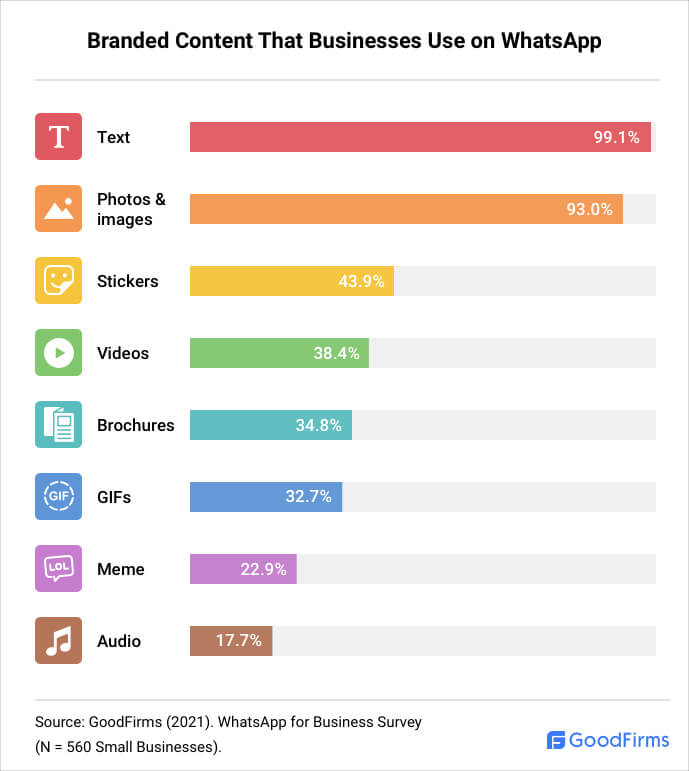
The second most used content type is the image. 93% of survey participants use photos and images.
A Sales & Marketing Manager at Premier Title Loans, Jessica Chase, mentions what kind of photos and images can help a business increase their conversion rate on WhatsApp.
She said, “People generally don’t want to read long paragraph-style messages because it takes too much time and effort, so pictures and images are the best kind of content to send through WhatsApp. They can do so by taking pictures of promotional content or customer-specific products. For example, if a customer couldn’t purchase a product because it was out of stock, they can send a picture of that product reshelved and invite them to come get it.”
Videos are a popular form of content on almost all platforms. They are proven to increase the conversion rate or engagement rate for businesses irrespective of the platform. In the case of WhatsApp for business, too, 38.4% of SMBs believe that videos work for them. However, there is a common misconception surrounding videos that not everyone can produce videos, and it requires a substantial amount of financial resources to create one.
Flynn Zaiger from Online Optimism offers a tip about this common misconception regarding video production.
“In a more visual world, images and videos are the best way to produce engaging content on social media. If you’ve never produced a video before, don’t stress about it. Any modern smartphone can take great video. Low production values often do far better on social media than highly produced pieces. If you’re looking for that extra edge on your photography, or videography, consider purchasing a basic tripod and ring-light to help you set the scene,” said Flynn.
There is one thing to note here. As much as customers enjoy visual content and engage with it, businesses also need to ensure that they are not overdoing it. Sending a limited amount of messages or visual content is the key to sustain in the long run.
Conclusion
Whatsapp has become a popular platform for personal and business use due to its reach, free usage, and multiple types of messages exchanged on the platform. Due to all these reasons, the Whatsapp business app can be one of the most powerful customer engagement channels, especially for businesses that want to operate globally. Right now, Whatsapp is onboarding businesses only after verifying and approving their profiles. So, SMBs should launch their business profiles as soon as possible to get the edge over their competitors.
As appealing as using Whatsapp for business sounds, there are certain tips and tricks here too. Businesses need to understand that they still need to maintain a professional front on their Whatsapp business account. Moreover, just because they have access to personal numbers of customers, they cannot send all sorts of messages throughout the day. There has to be a limit to the number of messages/content being sent. If managing business WhatsApp becomes overwhelming over time, then there is always an option to automate certain tasks with the help of automation tools.
To sum up, it can be said that if used correctly, a WhatsApp business app can enable businesses to reach new heights of success without burdening them financially or in terms of resources.
About the WhatsApp for Business Survey
GoodFirms surveyed 560 SMBs to get detailed insights into how small businesses use WhatsApp business.
The survey participants belonged to various business types - 34.8% of brick and mortar, 36.8% of online businesses, 22.3% of hybrid businesses, and 6.1% of others. Similarly, the participants were from a range of business sizes too.
15.4% of single employee businesses, 28% of businesses with 2-10 employees, 29.1% of businesses with 11-50 employees, 18% of businesses with 51-250 employees, and 9.5% of businesses with 251-500 employees.
The participants were mainly male (56.4%), female (36.4%), and the remaining 7.1% declined to respond. When it comes to their age group, a significant number of them were Millennials (49.3%), Generation X (32.9%), and Baby Boomers (17.9%).




